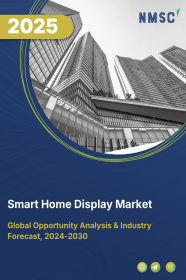
South Korea Smart Display Market by Display Technology (LCD, LED, E-Paper Display, and Other Display Technologies), by Type (Standalone Smart Displays, Integrated Smart Displays, Interactive Touchscreen Displays, Transparent Smart Displays, and Other Display Types), by Display Size (Below 24 Inch, 24 Inch to 55 Inch, and Above 55 Inch), by Resolution (UHD, FHD, HD, and Others) and Others – Opportunity Analysis and Industry Forecast, 2023–2030
Industry: Semiconductor & Electronics | Publish Date: 14-Feb-2025 | No of Pages: 81 | No. of Tables: 63 | No. of Figures: 26 | Format: PDF | Report Code : SE1035
US Tariff Impact on South Korea Smart Display Market
Trump Tariffs Are Reshaping Global Business
Market Definition
South Korea Smart Display Market was valued at USD 869.54 million in 2022, and is predicted to reach USD 3824.6 million by 2030, with a CAGR of 18.7% from 2023 to 2030. A smart display is a sophisticated device featuring a touchscreen or interactive visual interface, coupled with voice recognition and artificial intelligence capabilities.
Functioning as versatile information hubs, these displays can execute diverse tasks, including presenting information and managing smart home devices. They offer visual responses to voice commands, facilitating video calls and serving as interactive tools for scheduling, weather updates, and entertainment purposes.
Smart displays are meticulously crafted to elevate convenience, accessibility, and user engagement across various settings, such as homes, offices, and public spaces. Their applications span residential homes, offices, healthcare facilities, retail, education, and beyond.
Innovative Solutions for Health: Korean Startups Drive Surge in Smart Display Demand in Healthcare
The Korean-based startup companies are dedicatedly focusing on the development of the devices embedded with smart display specifically for the healthcare sector. This in turn, thrives the demand for the smart display market. Korean startup ICON.AI introduced the world's first 2-in-1 Smart Healthcare Device at CES 2021. It combines an Alexa Built-in Smart Display Speaker with a detachable health tracker, providing rapid assessment of vital health metrics in under a minute.
The device includes an LCD touchscreen, a 5W speaker, Bluetooth, and WiFi. The detachable health tracker monitors six critical health readings and can send reports directly to smartphones or tablets. This user-friendly technology has the potential to revolutionize personal health tracking.
Driving into the Future: South Korea's Automotive Revolution with Cutting-Edge Smart Displays
The integration of smart displays by leading automotive companies in South Korea is reshaping the market. These advanced displays offer enhanced connectivity and entertainment options, revolutionizing the driving experience. This surge in demand for vehicles with these displays is a key driver for the South Korean smart display market. Recently, Hyundai Mobis has pioneered the world's inaugural rollable automotive display.
This innovative screen can be rolled up and down to showcase driving information such as navigation, optimizing interior design by conserving space. Available in QHD resolution or higher, it enables the creation of large screens, exceeding 30 inches. This breakthrough promises to revolutionize automotive displays.
Security Vulnerabilities in Smart Home Displays Restrain Market Growth
Security vulnerabilities in smart display technology represent a significant restraining factor for the smart display market. The potential for security breaches in smart displays poses a substantial risk to users. Insufficient security measures, such as weak passwords and inadequate encryption, could lead to the exposure of sensitive data. Therefore, it is imperative for manufacturers to prioritize robust security features within smart displays, including strong authentication methods and prompt vulnerability patching through regular updates.
Introduction of Laser-Based Display Technology
Laser-based display technology is presenting substantial opportunities within the smart display market. Its exceptional brightness, color accuracy, long-lasting durability, and energy efficiency position it as a prime choice for diverse applications, spanning from home theaters to outdoor signage and augmented reality experiences. The extended lifespan and reliability of laser-based displays result in reduced maintenance costs and align with sustainability objectives.
As this technology becomes increasingly accessible and cost-effective, it is instigating innovation in the realm of smart displays, particularly in sectors where top-tier visual quality and energy conservation are paramount, thus broadening the market's potential for expansion.
Competitive Landscape
The South Korea smart display industry includes several market players such as Samsung Electronics, Qisda Corporation (BenQ), LG Corporation, Sharp Corporation, Lenovo Group Limited, Alps Alpine Co., Ltd, Sony Corporation, Google, LLC., Leyard Optoelectronic Co., and Amazon.com, Inc.
Key Benefits
-
The South Korea smart display market report provides a quantitative analysis of the current market and estimations through 2023-2030 that assists in identifying the prevailing market opportunities to capitalize on.
-
The study comprises a deep dive analysis of the market trend including the current and future trends for depicting the prevalent investment pockets in the market.
-
The information related to key drivers, restraints, and opportunities and their impact on the market is provided in the report.
-
The competitive analysis of the market players along with their market share in the South Korea smart display market.
-
The SWOT analysis and Porter’s Five Forces model are elaborated in the study.
-
Value chain analysis in the market study provides a clear picture of the stakeholders’ roles.
South Korea Smart Display Market Key Segments
By Display Technology
-
LCD
-
LED
-
E-Paper Displays
-
Other Display Technologies
By Type
-
Standalone Smart Displays
-
Integrated Smart Displays
-
Interactive Touchscreen Displays
-
Transparent Smart Displays
-
Other Display Types
By Display Size
-
Below 24 inch
-
24 inch to 55 inch
-
Above 55 inch
By Resolution
-
UHD
-
FHD
-
HD
-
Others
By Sales Channel
-
Direct Sales
-
Retailers and Distributors
-
E-Commerce Or Online Sales
By Application
-
Smart Home
-
Digital Signage
-
Automotive
-
Healthcare
-
Other Applications
REPORT SCOPE AND SEGMENTATION:
|
Parameters |
Details |
|
Market Size in 2022 |
USD 869.54 Million |
|
Revenue Forecast in 2030 |
USD 3824.6 Million |
|
Growth Rate |
CAGR of 18.7% from 2023 to 2030 |
|
Analysis Period |
2022–2030 |
|
Base Year Considered |
2022 |
|
Forecast Period |
2023–2030 |
|
Market Size Estimation |
Million (USD) |
|
Growth Factors |
The startup innovations in healthcare The integration of smart displays by leading automotive companies. |
|
Companies Profiled |
10 |
|
Market Share |
Available for 10 companies |
|
Customization Scope |
Free customization (equivalent up to 80 working hours of analysts) after purchase. Addition or alteration to country, regional, and segment scope. |
|
Pricing and Purchase Options |
Avail customized purchase options to meet your exact research needs. |
KEY PLAYERS
-
Samsung Electronics
-
Qisda Corporation (BenQ)
-
LG Corporation
-
Sharp Corporation
-
Lenovo Group Limited
-
Alps Alpine Co., LTD
-
Sony Corporation
-
Google, LLC.
-
Leyard Optoelectronic Co
-
Amazon.com, Inc.

















 Speak to Our Analyst
Speak to Our Analyst



















